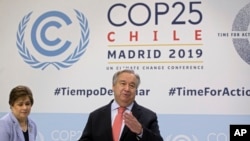The devastating impact of global warming that threatens humanity is a pushback from Nature under assault, U.N. chief Antonio Guterres warned Sunday ahead of a key climate conference.
"For many decades the human species has been at war with the planet, and now the planet is fighting back," he said, decrying the "utterly inadequate" efforts of the world's major economies to curb carbon pollution. "We must stop our war against nature, and science tells us we can do it."
Guterres flagged a U.N. report to be released in a few days confirming the last five years are the warmest on record, with 2019 likely to be the second hottest ever.
"Climate-related disasters are becoming more frequent, more deadly, more destructive," he said on the eve of the 196-nation COP25 climate change talks in Madrid.
Every year, air pollution associated with climate change kills seven million people, he noted, adding that human health and food security are at risk.
The U.N. chief's comments were clearly aimed at the handful of countries responsible for more than half of global greenhouse gas emissions, though he did not call them out by name.
President Donald Trump has set in motion the process that would see the United States withdraw from the Paris deal by the end of the year, and other major emitters -- China, India, Russia and Brazil -- have given scant indication that they will deepen their commitments.
Guterres singled out the European Union as playing a constructive role, saying the 28-nation bloc could help lead the way towards a net-zero global economy by 2050.
The Paris Agreement calls for capping global warming at under two degrees Celsius, and 1.5C if feasible.
But current national pledges -- if carried out -- would see global temperatures rise by at least 3C, a recipe for human misery, according to scientists.
Despite growing public pressure, the 12-day negotiating session is likely to remain technical in nature, focused on finalizing the "rulebook" for the Paris Agreement, which becomes operation at the end of next year.
Climate change is no longer a long-term problem, Guterres said.
"We are confronted now with a global climate crisis and the point of no return is no longer over the horizon -- it is in sight and hurtling towards us."




